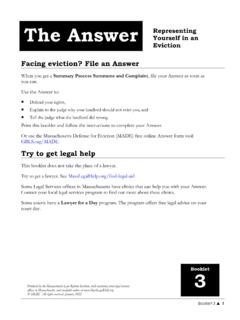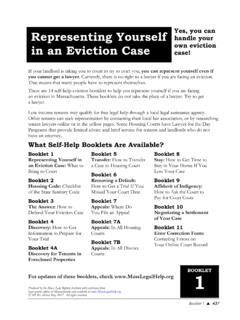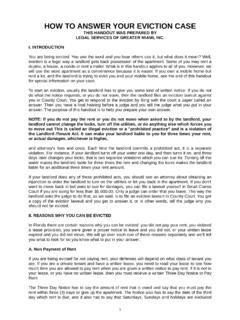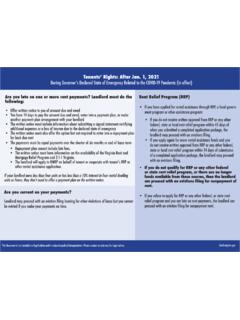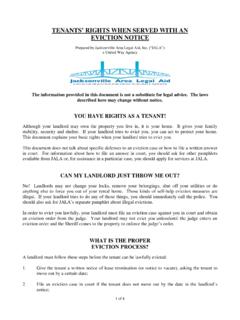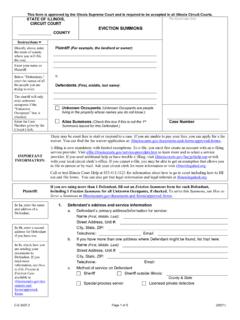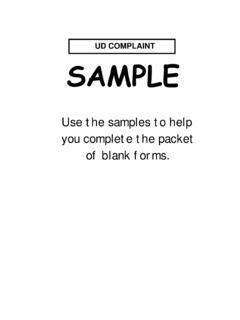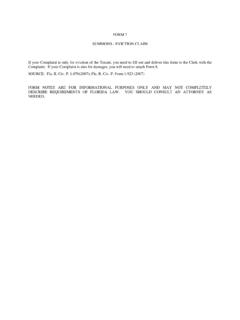Transcription of Discovery - MassLegalHelp
1 Booklet 4 473 How to Get Information to Prepare for your Trial Discovery can be an important part of your eviction case . It is a way to get information from your landlord to help you prove your case . When you request Discovery , your landlord must answer questions in writing and provide you documents about your eviction case . your landlord must answer your questions in writing under oath. Discovery also postpones your eviction trial for two weeks if you give a copy of your Discovery request to the court and to your landlord (or landlord s attorney) on or before your Monday Answer Date. If you do not request Discovery , you must go to court on the Original Trial Date listed on your Summons and Complaint. Discovery Representing Yourself in an Eviction case BOOKLET 4 Produced by the Mass. Law Reform Institute with assistance from legal services offices in Massachusetts and available at MLRI, revised May 2017. All rights reserved.
2 474 Booklet 4 How to Use Discovery Fill Out the Form in This Booklet Fill in the top of the Discovery form the same way you filled in the top of your Answer form in Booklet 3. To decide what information will help your case , read over your Answer. Ask questions and request documents that will help you prove your side of the story. As you go through the Discovery form, check the box next to every question that you want answered and every document that you want sent to you. If you have more questions or requests for documents, write them in the blank spaces at the end of the Discovery form. In this Discovery form, certain standard questions and documents are checked because tenants would want to request these in every case . Make sure you do not ask more than 30 questions. There is no limit on the number of document requests. Deliver Discovery by your Answer Date You must get the Discovery requests to the court and to your landlord (or your landlord s lawyer) with your Answer on or before the Monday Answer Date.
3 If you mail your Discovery on the Answer Date, it will not get there in time. When you are finished completing your Discovery form: 1. Fill in your name and address. Circle whether you are mailing or delivering these forms. 2. Make two copies of the Discovery form. Do not include these instructions. 3. Deliver the original to the court and 1 copy to your landlord or your landlord s lawyer. Keep 1 copy for yourself. Make Sure You Get your Discovery Responses your landlord must give you Discovery responses and documents within 10 days from the date the landlord receives your request. If your landlord does not or does not provide information you requested, you can ask the judge to order your landlord to answer Discovery . The last 3 pages of this booklet is a Compel Discovery form you can use to ask a judge to postpone the court hearing until the landlord fulfills your Discovery request. Prepare for Court When you receive the Discovery responses back, read your landlord s answers and look at all documents carefully.
4 Look for statements or information that back up your case . For example, your landlord may admit that you offered to pay rent, or that she knew about bad conditions in your apartment, or that she did not put your security deposit in a special bank account. Also watch for contradictions in your landlord s story. For example, your landlord may deny knowing about bad conditions, but state that she was in your apartment or hired people to do repairs. Use Discovery at your Trial At the court hearing, tell the judge or jury if your landlord, in her Discovery responses, admitted facts important to the case . You may also ask the landlord the same questions you asked in Discovery . If the landlord gives a different answer, point out the difference to the judge or jury. You can also ask the judge to look at documents that support your side of the story, including the landlord s Discovery responses themselves. Booklet 4 475 Discovery FORM (Please print or type) COMMONWEALTH OF MASSACHUSETTS TRIAL COURT a.
5 , ss: e. County Name of Court f. Docket No. Summary Process b. Rescheduled Trial Date (2 weeks after original trial date) c. Plaintiff(s) Landlord(s) DEFENDANT S REQUEST FOR Discovery (INTERROGATORIES AND DOCUMENT REQUESTS) vs. d. Defendant(s) Tenants(s) Notice to Plaintiff A. Because this Discovery has been filed and served, the trial date is automatically postponed for two weeks until the date stated above. If a jury trial has been requested and your case is in District Court then a pre-trial conference will be held at which time a jury trial date will usually be assigned. B. You are required by law to answer the interrogatories (questions) checked off below truthfully and fully, under the pains and penalties of perjury. Before each of your answers, you must re-state the interrogatory to which you are responding. Include all information that is available to you and to those who work with and for you.
6 You must also provide any and all requested documents in your possession or that of your agents or employees. C. No later than ten (10) days after you or your attorney receives this Request for Discovery , the court and the defendant must receive your responses to these questions and documents requested. Answers should be mailed or delivered to the defendant s apartment. D. You are also required to supplement and/or amend your responses to this Discovery if after you have responded you learn: a. the identity of other persons with information about the questions asked (including expert witnesses you intend to have testify at trial); and/or b. that any of the information you gave in the responses was incorrect when made or is no longer correct. 476 Booklet 4 E. If any documents that are responsive to the requests for production of documents checked off below are redacted (crossed out or deleted) or are not produced based on a claim of privilege or on any other grounds, please identify as to each such document or part of such document: a.
7 The nature of the privilege claimed; b. The factual and legal basis of the claim of privilege or ground for not producing the document; c. The title of the document; d. The author of the document; e. Each person to whom an original or copy of the document was provided; and f. The subject matter and a description of the material withheld, to the fullest extent possible short of waiving the claimed privilege. DEFINITIONS A. The terms you, plaintiff, and landlord include the plaintiff named above and any and all other persons or entities with any ownership in the premises, as well as plaintiff s agents, employees, relatives, attorneys, and anyone acting on their behalf. B. The term apartment refers to the house or unit that the tenant occupies, including the exterior and common areas. If the tenant has occupied more than one apartment under an arrangement with the plaintiff, this covers any and all apartments occupied by the tenant.
8 C. The term tenant includes the defendant(s) named above and his or her agents, relative(s), attorney(s), and anyone else acting on the tenant s behalf. D. The term building refers to the building, common areas, grounds, and any other apartments at the address where the tenant s apartment is located. E. The term document includes: writings, videotapes, electronic mail or other documents electronically stored and/or transmitted, drawings, graphs, charts, photographs, digital images, recordings, contracts, agreements, correspondence, memoranda, reports, notes, requests, bills, orders, notices, writs, declarations, complaints, answers and other court pleadings, schedules, tabulations, checks, diary entries, telegrams, diagrams, films, newspaper clippings, and other writings and recordings of whatever nature. A draft or non-identical copy is a separate document within the meaning of this term. F. The term concerning means referring to, relating to, supporting, describing, reflecting, constituting, or in any other way referencing.
9 G. Unless otherwise specified, the applicable time period for these requests is the period of the tenant s occupancy of the apartment(s), plus one month before such occupancy and one month afterward if the tenant has vacated. Booklet 4 477 INTERROGATORIES (Questions) Be sure to check no more than 30 questions Tenancy 1. What is the name, address, telephone number, occupation, and relationship to the tenant s apartment of the person answering these questions? 2. What is the name and address of each owner of the apartment, and the date s/he bought the building? 3. Please describe all members of the tenant s household (including the tenant) by name, age, gender, and date of move-in. 4. Please describe all the terms of the tenancy, including, but not limited to: a. The original rent; b. The day of each month on which rent is due; c. Whether the rental agreement was oral or in writing, and the time period of such an agreement; d.
10 The responsibility of each of the parties for payment of water, heat, hot water, electricity, cooking fuel for the apartment, and for any common area utilities and whether these responsibilities are in writing; e. Any additional terms of the original tenancy; and f. Any changes in the terms of the tenancy (including, but not limited to, changes in rent), including the date(s) of all such changes, whether the changed terms were in writing, and what the changed terms were. Landlord s Claims 5. State each and every one of your reasons for evicting the tenant, whether or not stated in the complaint. If you claim the tenant, household member, or guest has violated a provision of the lease or rental agreement, please describe each such violation in full and complete detail, including, but not limited to: a. What happened; b. The dates of each such alleged violation; c. When and how you learned of the alleged violation; d. The names and addresses of anyone with knowledge of or information about such alleged violation; e.
